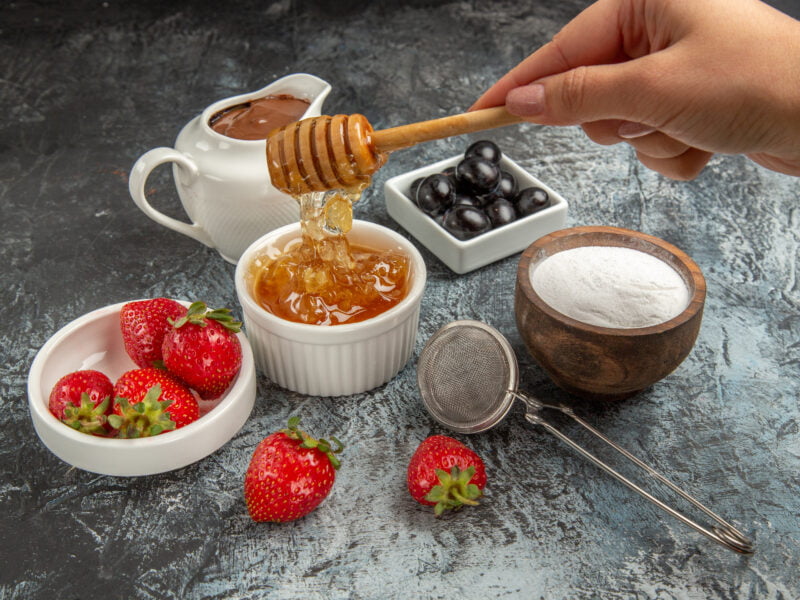When fasting, a common question is whether probiotics can break a fast. Interestingly, most probiotics, especially in capsule or powder form, contain little to no calories, meaning they won’t disrupt your fast. However, checking the label for added sugars or fillers is crucial, as these can introduce calories and potentially break the fast.
Beyond that, probiotics can be highly beneficial during fasting. Research suggests that fasting alters the gut microbiome, and probiotics can help maintain a healthy balance of gut bacteria. They improve digestion, boost immunity, help in wight management and support overall gut health, which can enhance the benefits of intermittent fasting.
Probiotics may make fasting easier and more effective by maintaining gut health. Incorporating them into your routine can be a smart move for those looking to optimize their digestive health and fasting results without breaking the fast itself.
What Are Probiotics and How Do They Work During Fasting?
Probiotics are live microorganisms that support gut health by maintaining a balance between beneficial and harmful bacteria. Found in supplements and fermented foods, they aid digestion, nutrient absorption, and immune function.
Probiotics During Fasting
When fasting, your digestive system slows down, and the gut microbiome may shift. Probiotics help maintain gut health by promoting healthy bacteria, like Lactobacillus and Bifidobacterium, which aid digestion when food is reintroduced. Studies show that fasting can improve gut bacteria diversity, and probiotics can enhance this benefit.
Do Probiotics Break a Fast?
Most probiotics, particularly in capsule or powder form, don’t contain enough calories to break a fast. However, probiotic-rich foods, like yogurt, may contain calories and disrupt strict fasts.
By taking probiotics during fasting, you support gut balance, which can improve digestion and nutrient absorption, making fasting more comfortable and practical.
Does Probiotic Supplementation Break Intermittent Fasting?
Many people wonder if taking probiotics breaks a fast when practicing intermittent fasting. The key factor to consider is the calorie content in probiotic supplements. Most probiotics, particularly those in capsule or powder form, are calorie-free or contain minimal calories, which means they generally do not break a fast. Since the purpose of intermittent fasting is to avoid calorie consumption, taking calorie-free supplements like probiotics won’t interfere with the fasting process.
However, certain probiotic-rich foods, such as yogurt or kombucha, contain calories and should be avoided during fasting periods if you’re following a strict fast. These foods can stimulate digestion and insulin production, potentially breaking the fast. Opt for probiotic supplements without added sugars or fillers to maximize fasting benefits without breaking the fast. Always check labels to ensure the product aligns with your fasting goals and fits into your meal plan for intermittent fasting.
Are Probiotic Foods Different From Supplements During a Fast?
Yes, probiotic foods and supplements differ in their effects on fasting, mainly due to caloric content. Probiotic supplements, such as capsules or powders, typically contain few calories, making them safe to take during a fast without breaking it. For example, most probiotic supplements contain fewer than 5 calories per serving, which is unlikely to trigger insulin or digestion responses, allowing you to maintain the benefits of intermittent fasting.
In contrast, probiotic-rich foods like yogurt, kefir, and kombucha often contain significant calories. A single serving of yogurt can contain 100-150 calories, while a bottle of kombucha may have around 30-50 calories, mostly from sugars. These foods can break your fast by stimulating digestion and spiking insulin levels, reducing the metabolic benefits of fasting.
To stay in a fasted state, it’s best to opt for calorie-free or very low-calorie probiotic supplements and avoid probiotic foods until your eating window. Always read labels to ensure supplements have no hidden sugars or fillers that could interfere with your fasting goals.
How Probiotics Can Enhance Your Fasting Results?
Incorporating probiotics into a fasting regimen is gaining traction as a way to enhance the health benefits of fasting. Probiotics, which are live microorganisms that confer health benefits to the host, can play a supportive role in the fasting process. Here’s a detailed look at how probiotics can enhance fasting results:
1. Maintenance of Gut Health
During fasting, the absence of food can alter the gut microbiome’s balance, as the bacteria in the gut typically feed on the fiber and other nutrients in food. Probiotics can help maintain a healthy balance in the gut microbiota during these periods. They contribute beneficial bacteria that can compete with pathogenic bacteria, potentially preventing dysbiosis (a microbial imbalance). This is crucial because a healthy gut microbiome is associated with improved digestion and nutrient absorption, which is vital when limiting food intake.
2. Improved Metabolic Function
Probiotics may enhance the body’s metabolic function during fasting. Fasting shifts the body’s energy from glucose stored in the liver to fatty acids and their by-products called ketones. Certain probiotics can influence the metabolism of fats and sugars, aiding in this metabolic shift. By enhancing the body’s ability to switch its energy source, probiotics can make fasting more efficient and potentially increase fat loss during prolonged periods of fasting.
3. Enhanced Immune Response
Fasting can reduce the nutrients needed for a robust immune system, potentially leaving the body susceptible to infections. Probiotics play a role in modulating the immune system by enhancing the mucosal immune response, the body’s first line of defense against pathogens entering the gut. They help regulate the function of immune cells within the gut, maintaining a balanced immune response that is crucial during fasting.
4. Reduction in Inflammation
Both fasting and probiotics are known to reduce systemic inflammation. Probiotics help produce short-chain fatty acids (like butyrate) when fermenting dietary fiber in the colon. These fatty acids can strengthen the gut barrier and lower inflammation. Since inflammation is linked to various chronic diseases, including heart disease and diabetes, reducing inflammation through fasting and probiotics can promote long-term health benefits.
5. Mood and Cognitive Benefits
The gut-brain axis is a communication network that links the emotional and cognitive centers of the brain with peripheral intestinal functions. Probiotics can produce neurotransmitters and other neuroactive substances that regulate mood. When mood swings and irritability are common during fasting, maintaining a balanced gut-brain axis through probiotics can help stabilize mood and enhance cognitive function.
6. Appetite Control
During fasting, managing hunger is a significant challenge. Probiotics may help regulate hormones involved in hunger and satiety, such as ghrelin (which stimulates the natural appetite) and leptin (which decreases it). By influencing these hormones, probiotics can help reduce the feeling of hunger during fasting periods, making it easier to maintain the fast.
When Should You Take Probiotics During Fasting?
Determining the perfect time to take probiotics during fasting can maximize their effectiveness and support your fasting goals. Here are specific considerations with numerical details to guide your decision on when to take probiotics during fasting:
1. Consider the Type of Fasting Protocol
- Intermittent Fasting (16/8, 14/10, etc.): For those practicing intermittent fasting, where you fast for 16 hours and eat during an 8-hour window, or fast for 14 hours with a 10-hour eating window, it’s advisable to take probiotics during your eating period. This helps ensure the probiotics are less affected by stomach acidity, which is heightened during fasting.
- Prolonged Fasts (24+ hours): If you are engaging in a fast longer than 24 hours, consider taking probiotics right before you begin your fast. You could take water-only fasts with a small amount of water during a time of day when digestive juices are typically at their lowest, generally early morning.
2. Align with Meals During Eating Windows
Taking probiotics with your first meal after fasting can increase survival rates by up to 50%, as food helps buffer stomach acid and supports bacterial survival through the digestive tract.
3. Check the Probiotic Formulation
- Enteric-Coated Probiotics: These formulations are designed to pass unaffected through the stomach, releasing their contents in the intestine where pH levels are more suitable. Studies suggest that enteric coating can improve the delivery of live probiotics to the intestine by over 90%.
- Non-Coated Probiotics: Taking these with a meal can enhance bacterial survival by up to 60%, compared to taking them on an empty stomach.
4. Listen to Your Body
Individual tolerance can vary; about 20% of people report better tolerance when taking probiotics on an empty stomach, while others experience less discomfort with food. Adjusting the timing based on personal comfort and effectiveness is recommended.
5. Consult Healthcare Providers
Consider consulting with healthcare professionals who can provide guidance based on the latest research and your health profile. Approximately 10% of people might experience changes in their gut microbiome within just a few days of starting probiotics, showing quick responsiveness to the right probiotic regimen.
Probiotics and Other Supplements: What’s Safe During a Fast?
Deciding what supplements to take during a fast, including probiotics, can be a nuanced decision that depends on your goals for fasting, the type of fast, and individual health considerations. Here’s a guide on probiotics and other common supplements and their safety during fasting:
1. Probiotics
Probiotics are generally considered safe during fasting because they are not digestible food but live bacteria that support gut health. They do not break a fast traditionally because they contain no calories that would disrupt metabolic fasting processes. However, probiotics can be beneficial for gut health and maintaining a balanced microbiome during fasting, especially if taken during the eating window in intermittent fasting scenarios.
2. Multivitamins and Mineral Supplements
- Water-Soluble Vitamins: Vitamins such as B vitamins and vitamin C are generally safe during fasting and can be taken without food. However, some people may experience stomach upset when these are taken on an empty stomach.
- Fat-Soluble Vitamins: Vitamins A, D, E, and K are best absorbed with fat and should be taken during eating periods if you are following an intermittent fasting schedule.
3. Electrolytes
Electrolytes like sodium, potassium, and magnesium are crucial, especially during prolonged fasting or fasting that involves fluid restriction. Supplementing with electrolytes can help maintain fluid balance, prevent dehydration, and support nerve and muscle function. They do not contain calories and thus do not break a fast.
4. Fish Oil and Omega-3s
These supplements are high in fatty acids and are generally taken to support cardiovascular health and reduce inflammation. Since they are fats, they technically break a fast. If your fasting goals are focused on caloric restriction or weight loss, it’s best to consume these during your eating window to maintain the benefits of fasting.
5. Amino Acids
Branched-chain amino acids (BCAAs) often support muscle building and prevent muscle waste. Since they can trigger an insulin response and contain calories, they technically break a fast and should be taken during eating windows if you are intermittent fasting.
6. Herbal Supplements
- Non-caloric herbal supplements: Such as green tea extract, turmeric, and others, are generally acceptable to take during a fast as they do not provide calories and can even aid the fasting process by supporting hydration and providing antioxidants.
- Caloric herbal supplements: Any herbal supplements containing sugars or oils can break a fast and should be taken during eating periods.
7. Fiber Supplements
If the goal of fasting is gut health, some might consider fiber supplements risky during a fast as they can cause gastrointestinal discomfort when taken without food. If taken, it’s advisable to consume them during eating periods to minimize potential discomfort.
Recommendations
It’s essential to align supplement intake with the type of fasting protocol you follow and your specific health needs. Consulting with a healthcare provider before beginning any best supplement for men or women can regimen in conjunction with fasting is crucial to ensure safety and effectiveness, especially for those with underlying health conditions or those taking prescription medications.
Concluding Heading: How to Maximize Fasting Benefits with the Right Probiotics?
In conclusion, understanding whether probiotics and other supplements interfere with fasting is essential for optimizing their fasting benefits without disrupting the fast. Probiotics, especially in capsule or powder form, are generally safe to take during fasting as they contain little to no calories and do not trigger an insulin response that would break a fast. These supplements support gut health and enhance the various physiological benefits associated with fasting, such as improved metabolic function, immune support, and reduced inflammation.
However, due to their caloric content, probiotic-rich foods like yogurt or kefir should be consumed during your eating windows. Always check the labels of your supplements for any added sugars or fillers that could compromise your fasting goals. By carefully selecting the right probiotics and aligning their intake with your fasting schedule, you can effectively support your body’s health and enhance the effectiveness of your fasting regimen.





